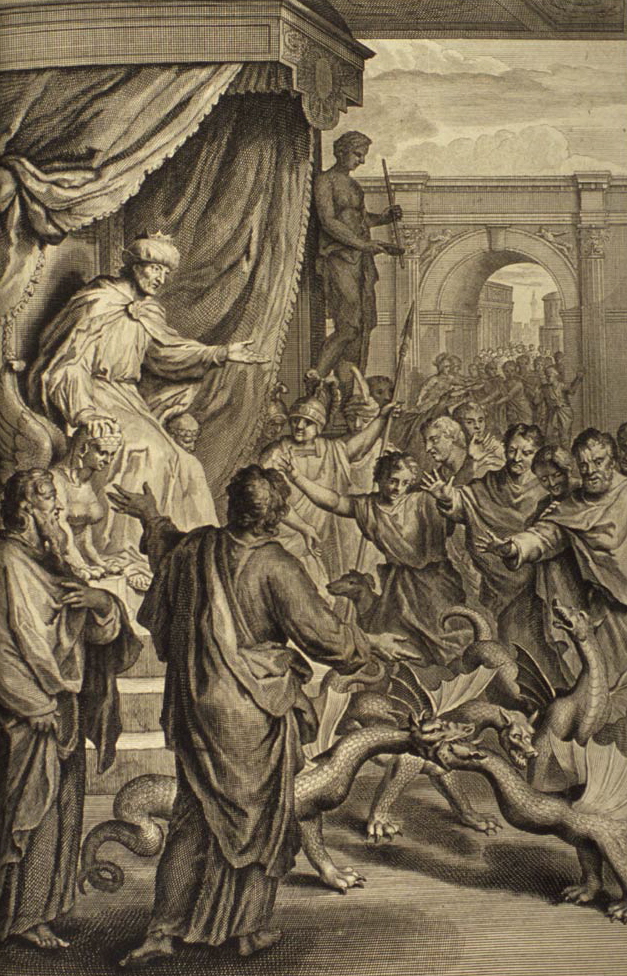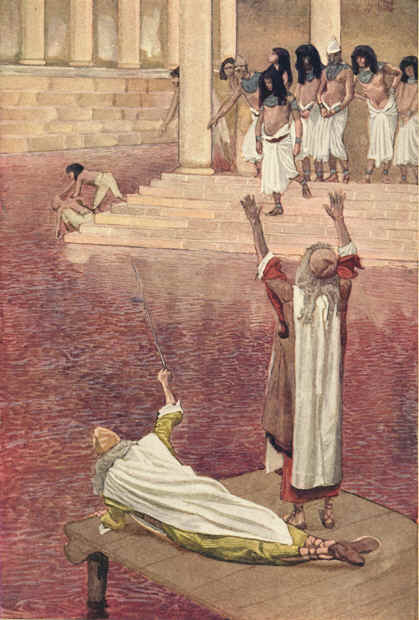Old Testament
Yesterday, Moses tried to get Pharaoh to let the people of Israel go worship their God, failed, and got everyone angry at him. Today, Moses points that out to God. God goes on about how he is the God of the people of Israel and remembers his covenant. God's tone suggests he might be getting impatient with Moses.
You can be sure that I have heard the groans of the people of Israel, who are now slaves to the Egyptians. And I am well aware of my covenant with them.Of course, my reading may be biased. I always read the phrase "well aware" in a tone that implies frustration
Moses and Aaron meet with the people of Israel again, but they no longer want to listen. According to the text
They had become too discouraged by the brutality of their slavery.Another way to read this: the people of Israel know that Moses and Aaron's interference increased their workload once. This makes them reluctant to listen to the two of them again.
Genealogy break! We get the genealogy of some of the clans of Israel. Nothing too exciting, but we do learn that Levi lived to be 137, his son Kohath lived to be 133, and Kohath's son and Moses' father Amram lived to be 137. Also of note is that Moses is the great grandson of Levi and Moses' mother was his father's aunt.
Moses and Aaron go and show Pharaoh their stuff. First, Aaron turns his staff into a snake (one is led to wonder why he did not try that trick in the first meeting given that God had already given Moses the ability to do so). However, Pharaoh scoffs at the trick because his magicians come and do the same thing with their staffs (and Aaron's snake eats up theirs). I could accept that God gave Moses and Aaron the ability to turn their staffs into snakes. However, this story claims that the Egyptian magicians were capable of the same thing. Since I do not believe that people can go around turning staffs into snakes, this story makes me think more that the Biblical author and audience were superstitious (by modern standards). This, in turn, makes me that much more skeptical of any of the other miraculous events described.
Moses and Aaron's next turn the water of the Nile to blood. Real blood, or, at least, something toxic enough to kill all the fish. And not just the water in the Nile, God told Moses to tell Aaron to
Turn all the water to blood. Everywhere in Egypt the water will turn to blood, even the water stored in wooden bowls and stone pots.However, the Pharaoh was not impressed. His own magicians did the same thing (one wonders where they got the water since Aaron was supposed to have turned all of it to blood). We then read that,
Pharaoh returned to his palace and put the whole thing out of his mind.Really? Really?!? All of the water in his country has been turned into toxic, reeking blood, and Pharaoh just goes back to his palace and forgets about it? Even if he does not care about the people of Egypt, he almost certainly has a sense of self preservation and would be worried that he no longer has any water to drink.
New Testament
People should be forgiving because God forgives us even more. A man should not be allowed to divorce his wife unless she has committed adultery. Also, people should avoid marriage if they can
Jesus' disciples then said to him, "If this is the case, it is better not to marry!"And I would guess that a lot more Christians could accept not being married than do accept it.
"Not everyone can accept this statement," Jesus said. "Only those whom God helps. Some are born as eunuchs, some have been made eunuchs by others, and some choose not to marry for the sake of the Kingdom of Heaven. Let anyone accept this who can. [emphasis mine]
Psalms and Proverbs
Today's psalm is a famous one. It also is the first thing I have read in the Bible makes it an attractive basis for a belief system. It the whole Bible had the tone of this psalm, then I would be a lot less inclined to dismiss the Bible as a primitive collection of myths and history.
The Lord is my shepherd;This psalm also highlights the fact that that the New Living Translation sucks when it comes to Biblical poetry. The translation has greater accuracy than the King James version, and it is more comprehensible to modern readers, but
I have all that I need.
He lets me rest in green meadows;
he leads me beside peaceful streams.
He renews my strength.
He guides me along right paths,
bringing honor to his name.
Even when I walk
through the darkest valley,
I will not be afraid
for you are close beside me.
Your rod and your staff
protect and comfort me.
You prepare a feast for me
in the presence of my enemies.
You honor me by annointing my head with oil.
My cup overflows with blessings.
Surely your goodness and unfailing love will pursue me
all the days of my life,
and I will live in the house of the Lord
forever.
Even when I walk through the darkest valley, I will not be afraidhas nothing on
Yea, though I walk through the valley of the shadow of death, I will fear no evil



From the genealogy, Jacob had 12 sons in Egypt. Two generations later (Kohath and Amram), the Jews outnumbered the Egyptians, which is why Pharaoh made them slaves (Exodus 1). I assume this takes place in Memphis, capital of ancient Egypt, which had a population on the order of 10,000 people. This means the Jews must have numbered 5,000-ish people. Let's also assume that half of them were men (not sure if this is a good assumption, but I'll run with it), so in two generations we have gone from 12 men to 2500. That means that each man averaged over 14 sons who grew up to start families of their own. If you then factor in a 40-ish percent child mortality rate in ancient Egypt, each man must have averaged about 25 sons (and presumably a few daughters too).
ReplyDeleteI wonder how many other people have done this analyis. The conspiracy nut in me wants to say this is why clergy never mention how many generations came between Jacob and Moses.
big-bad-al, thanks for doing that calculation! Those numbers are hard to believe.
ReplyDelete>one wonders where they got the water since Aaron was supposed to have turned all of it to blood
ReplyDeleteLOL. Although, the alternative has a cartoon-stupid villain feel to it: *Almost* all the water is turned to blood. And just as Pharaoh is about to take a drink, his magicians run in. "Pharaoh, Pharaoh, check it out!" And then they promptly turn his water into blood too.
>Re-Really? Really?!? All of the water in his country has been turned into toxic, reeking blood, and Pharaoh just goes back to his palace and forgets about it?
Maybe Pharaoh was vampire. Sheesh. All these alleged contradictions in the Bible are so easy to sort out.
Oooh, that explains it. I wonder if Pharaoh sparkled.
ReplyDelete